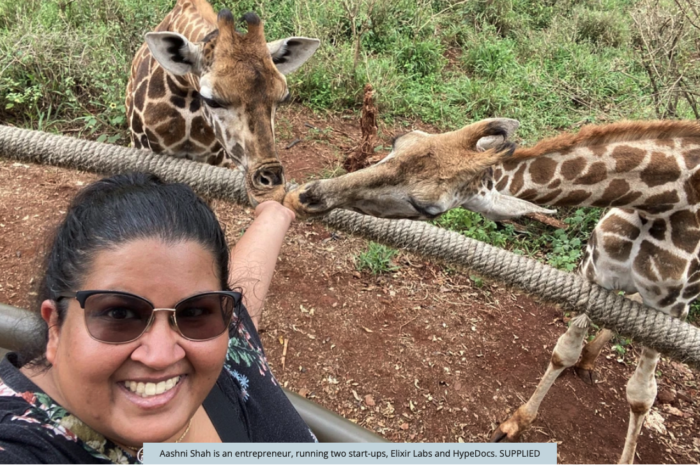
Aashni Shah has a message for others who are living with obesity: “Stop looking at the number on the scale, find the things that inspire you, and start focusing on what you want your life to look like.”
Aashni Shah has worked as a software engineer at Microsoft and fintech credit card company Square. She’s now an entrepreneur shaping her startups Elixir Labs, which partners with other non-profits to build tech solutions for social good, and HypeDocs, which helps people track their personal achievements, for, as her tag line reads, “Building a Better Tomorrow.” This is her story about living with obesity.
This story has been edited for length and clarity.
My ancestors are from India, but I was born and raised in Kenya. From a young age I’ve been heavily involved with giving back wherever I can. In school, I ran a lot of fundraisers and donated the money we raised to schools, orphanages and libraries.
I moved to Canada in 2011 to study computer science at the University of Toronto, and then went to work at Microsoft in Vancouver and then the credit card processing company Square in Kitchener, Ontario. Now, as an entrepreneur myself, I want the tech products that I build with my own company to have a positive impact in the world. I may even implement [my achievement tracking platform] HypeDocs into some of the work being done by advocacy group Obesity Matters .
You can only get married if you are fit and beautiful
I have struggled with weight issues pretty much my whole life. Our family has always been on the larger side, and food has always been a big part of our family interactions. And with the background and culture I come from, there’s a [belief that] you’re only happy and your life isn’t complete until you’re married, and you can only get married if you’re fit and beautiful.
From a very young age, I’ve had people who care about me tell me I need to lose weight. I know it wasn’t intentional, but the way they said it was often hurtful, and sometimes it made me defensive, it made me hide and avoid conversations with them. I try to extract what they’re saying from how they’re saying it — the message is important even though the delivery is terrible.
I was teased when I was younger, but I let my personality speak so loudly that even though it happened frequently, I didn’t let it bother me. I think part of the reason I’m so outwardly friendly today is because I know what it feels like to be picked on, for someone to ignore you or overlook you or assume that you are lesser than you are just because you have a couple of extra kilos. It’s not a reason to judge a person.
I have been to so many events where I can feel someone I’m having a conversation with looking over my head for someone more interesting to talk to. Which is unfortunate because I have a pretty unique background, with unique and interesting stories and experiences to share. I’m learning not to take this personally, because if you can’t see me for who I am then you’re not worth my time either.

I think there are a lot of people who associate being heavy with being lazy, and to some extent lazy also implies not smart. I was fortunate to have a good group of friends who looked past that. I never felt lonely, which I think a lot of larger people often feel.
When I lived in Vancouver, that was probably my first really big attempt at focusing on weight and fitness. I got a personal trainer, I was going to the gym multiple times a week, and I would go hiking on the weekends with my friends. As a natural side-effect of constantly working out my eating improved a lot, I was cooking at home a lot more. So the combination of that brought me to one of the lowest weights I’ve been in a long time.
Unfortunately, my weight was so heavily tied to my emotions. In Vancouver, I had amazing friends and was having such a great time there, but when I moved to Kitchener, I really struggled. It wasn’t the type of lifestyle I wanted for myself. So I wasn’t exercising as much as I should have been, and ordering in a lot more. The combination of being more sedentary and eating a lot more resulted in me gaining a lot of weight.
I joined Weight Watchers, which is probably the closest to a diet process that I followed. I really enjoyed it because it provided structure and rules I could follow and that helped me lose quite a lot of weight safely, which is what I liked over any of the fad diets. When I moved back to Toronto, the pandemic happened and everything went topsy-turvy and I ended up gaining all of that weight back, and a bit more.
A diet isn’t going to solve anything if you don’t solve underlying mental issues
A diet isn’t going to solve anything if you don’t solve the underlying mental issues associated to your food problems. You need to do both in tandem because as soon as you’re done with the diet you’re going to put all that weight back on and it’s a really awful cycle. Usually if you manage to solve the underlying issues you can really help take care of the other issues as well.
I’m not 30 yet and I was struggling to do things that someone who’s 50 might be struggling with and I didn’t like that. One of the reasons I wanted to lose weight is because I’m really outdoorsy. I love hiking and scuba diving and as I get larger those things become harder to do. If and when I have children, I want to do those things with them. But if I stay on this trajectory of being overweight I probably won’t be able to.
I’ve always been a very outspoken person and very comfortable in my own skin but I really felt in the last year or two I started hiding a lot more and turning down opportunities, and that’s so different to my personality. So I’ve been really trying to flip that around. I’ve spent a lot of the last eight months really focusing on my health and trying to prioritize that and make sure that I get myself mentally to a happier place.
This article was originally written by Robin Roberts and published by Healthing on September 21, 2022 in collaboration with Obesity Matters’ Community.